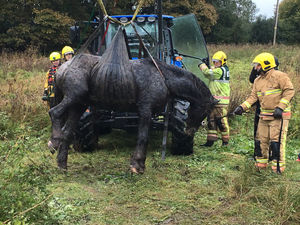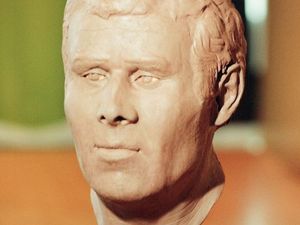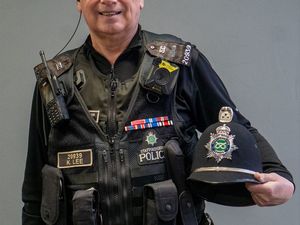Firefighters rescue nearly two animals a week in Staffordshire
From cows stuck in slurry pits to dogs trapped in baby gates - firefighters have had to rescue nearly 300 animals in Staffordshire in three years.

While some of the larger operations are among the most 'dangerous' incidents the fire service is presented with, others firmly fall at the bizarre end of the spectrum.
Staffordshire Fire and Rescue Service has stated the rural make-up of the county leads to a high number of incidents.
There were 99 rescues in 2016 - nearly two a week - with horses the most frequent to find themselves in trouble accounting for 23 incidents followed by dogs (21).
Firefighters were regularly called to free large animals from rivers while unusual incidents included seven dogs stuck in the back of a car and a falcon which had tethered itself to a television aerial.
In 2015 a total of 88 animal rescues were carried out with birds (19) and cats (18) involved most frequently.
The more bizarre incidents featured two call-outs to cats stick underneath car bonnets and a fox caught in football nets.
Among the 98 rescues in 2014 firefighters helped free a set of kittens from underneath a bath and a dog hanging out of a first floor window.
Animal Rescue lead Tim Collis from Cannock Community Fire Station said: “Staffordshire is predominantly a rural community and large animal rescue is recognised as one of the most dangerous activities a firefighter will be engaged in.
"It is essential, therefore, to ensure firefighters have specialist training and equipment so as to protect themselves and the animal, as well as members of the public who may be at risk of injury.
“Firefighters regularly use their skills to deal with a range of different rescues involving livestock, wild animals and pets.
"The larger species more commonly rescued are horses, cattle, pigs, sheep and deer that get trapped in bogs, slurry pits, rivers, pools, ditches and machinery or by road incidents.
"If the animal cannot be safely rescued by vets or colleagues from the RSPCA, and lifting or cutting equipment is needed to free the animal, then the Service can assist.
“Incidents of this nature are attended by specialist animal rescue teams (based at Cannock and Leek who are trained in animal rescue) they have been trained to nationally accredited standards, are knowledgeable about animal psychology, know how to handle different species and how to react to an animal in distress.
“They have the skills to use specialist equipment including harness rescue systems, cutting tools and water rescue equipment if required.”





